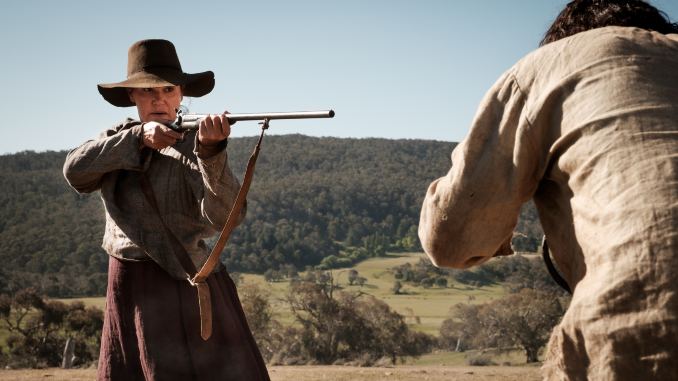The Legend of Molly Johnson Is A Fiercely Feminist Outback Fable

The harsh landscape of the 19th century Australian outback is arguably the least of anyone’s worries in The Legend of Molly Johnson, the feature debut from writer, director and star Leah Purcell. While this might be the artist’s first plunge into narrative filmmaking, the tale is one that Purcell has been spinning for the past six years. Based on Henry Lawson’s 1892 short story The Drover’s Wife, Purcell’s version was first conceived as a 2016 stage play and then adapted into a novel in 2019 before landing in its current cinematic iteration. In all of her retellings, Purcell expands upon the tragic titular character’s backstory, providing her protagonist with a feminist backbone, a pronounced connection to Aboriginal culture and, most vitally, a name.
Molly Johnson (Purcell) lives amid the Snowy Mountain range in New South Wales’s High Country, often acting as the sole caretaker of her four young children while her husband is out on extended cattle-droving expeditions. A formidable woman, she always has her trusty shotgun within arm’s reach, ready to blow away a rogue steer or unwanted intruder who threatens the safety of her beloved children. Her maternal instincts are amplified when she’s once again left alone with the young ones—this time heavily pregnant, her child due any one of these arid days. When two newcomers arrive on her property, she immediately points the barrel of her gun at their chests. The couple explain that they’re a husband and wife originally from London, and they’re en route to a nearby town so that he can fill a vacant position as sergeant and “uphold Her Majesty’s law and administer the new legislations.”
Approximately 100 years after the colony of New South Wales was established in British-occupied Australia, the land is still in desperate need of “law and order,” which amounts to insisting that the rule of the Queen be respected and followed by all. Sensing that Sergeant Klintoff (Sam Reid) and his wife Louisa (Jessica De Gouw) are curiously well-intentioned (and comparatively wealthy), Molly sends her children off with them for an extended stay so that they can socialize, eat richly and leave her in peace to deliver the baby. She sees them off with a kiss and her best wishes, and immediately goes off on a solitary trek to reconnect with nature. When she arrives back home, however, she’s greeted with a shock: A man lies prone in her front yard, badly beaten, with a shackle clasped around his neck. He’s clearly a fugitive, and Molly aims her gun at him out of fear. Just then, a contraction hits her with a wave of agonizing pain. The man rises to his feet, ax at the ready in one hand. Seeing Molly’s water break as she wails, he extends his free hand to her, offering much-needed help during an unexpectedly difficult delivery. As it turns out, the stranger is an Aboriginal man named Yadaka (Rob Collins) who has managed to escape wrongful imprisonment. His crime? “Existing whilst Black.”
There are several major departures between Purcell’s tale and Lawson’s short story, all of them serving to contextualize the racist and misogynistic origins of Australia’s neocolonial national identity. In the original, the title character isn’t given a name at all—she’s simply “the drover’s wife,” and her loyal canine sidekick is called Alligator. (Of course, the dog is given a name while the woman remains totally anonymous, save for her marital ties.) The tale takes an anxious turn when the woman notices a snake enter the house from under the floorboards. Her husband away droving, she sends the children off to bed and stays up all night with Alligator, intent on capturing and killing the serpent that quietly stalks the house. They’re ultimately successful in their hunt, a conclusion that ostensibly serves to demonstrate the outback-produced grit and gumption of Australian-born women. Honestly, that core tenet also runs through The Legend of Molly Johnson, which emphasizes Molly’s rugged self-reliance whenever possible. When word comes out of a murderer on the prowl who targets women and children, the newly-appointed Sergeant Klintoff begins to fret about Molly all alone in the outback. “Nothing delicate about our mountain women,” responds a local clergyman. “Molly Johnson grew up out here. She knows the ways—crack shot, too.”
-

-

-

-

-

-

-

-

-

-

-

-

-

-

-

-

-

-

-

-

-

-

-

-

-

-

-

-

-

-

-

-

-

-

-

-

-

-

-

-








































